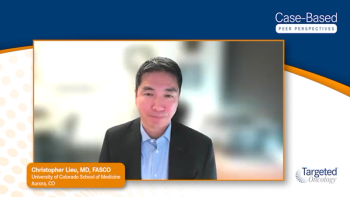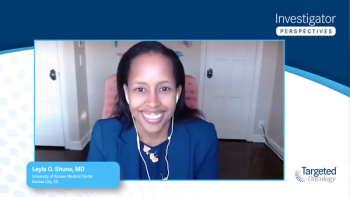
Ovarian Cancer: Current Status and Future Directions
Ramez Eskander, MD, summarizes the current status of ovarian cancer treatment and reviews unanswered questions and future directions.
Episodes in this series

Ramez Eskander, MD: I want to take a moment to talk about where we are with ovarian cancer therapy. We were very excited about the potential opportunity for immunotherapy in patients with ovarian cancer, but unfortunately all the studies conducted to date have been negative. We’ve had the JAVELIN series, JAVELIN 200 and JAVELIN 100, which showed no benefit with incorporation of immune checkpoint inhibitor with chemotherapy in the platinum-resistant and platinum-sensitive settings. We’ve also had the IMagyn050 trial, which looked at atezolizumab and bevacizumab as a maintenance strategy in the front line. Again, it showed no difference in the patient populations. And we haven’t been able to define a particular biomarker cohort that may potentially benefit the most from immunotherapy. It’s unclear what the role of immunotherapy is going to be. I can tell you that right now we are awaiting the results of multiple prospective frontline clinical trials. We have ATHENA, we have FIRST, we have DUO-O, among others, which are looking specifically at the question of chemotherapy, immunotherapy, and PARP inhibition strategies, and the immunotherapy PARP combination and whether PARP inhibitors can drive neoantigen formation and sensitize to immunotherapy or immune checkpoint inhibition. We anticipate some of these may read out soon. We are anxious to see what the results are.
As it stands right now, we have yet to identify immunotherapy as an effective treatment in ovarian cancer in the frontline setting. Again, there are exceptions. There are patients who are biomarker positive who happen to have ovarian cancers that have a high tumor mutational burden, who are MSI [microsatellite instability] high. Those patients may benefit from immune checkpoint inhibition based on prior studies, collective trials that included multiple solid tumors that were tumor mutational burden high. In other areas, we have NRG-GY009, which is a platinum-resistant study looking at Doxil [doxorubicin hydrochloride liposome injection], bevacizumab, and atezolizumab. That may be a study that could inform efficacy, although we are waiting for that study to mature to see whether the combination matters. Is the chemotherapy drug combination relevant with immunotherapy or not? We have unanswered questions, but we have multiple frontline trials, several of which have completed accrual. We’re waiting on the data to mature, which may inform treatment opportunities in this setting.
This transcript has been edited for clarity.
Case:A 64-Year-Old Woman With Ovarian Cancer
Initial Presentation
- A 64-year-old woman presented with abdominal bloating, low back pain, early satiety and progressive fatigue
- PMH: hysterectomy 5 years ago for benign indication; hypothyroidism managed medically; generalized anxiety disorder managed medically
- PE: diffuse lumbosacral pain with movement; abdominal tenderness and significant abdominal distension with a fluid weight consistent with ascites; unintentional weight loss of 8 lbs
- ECOG PS 1
Clinical work-up
- Pelvic ultrasound showed a ~5-cm complex left ovarian mass
- Chest/abdomen/pelvis CT revealed a complex pelvic mass and was also notable for abdominal ascites, omental cake, and retroperitoneal and inguinal adenopathy
- Paracentesis (1200cc) cytology confirmed high-grade serous ovarian cancer
- Omental biopsy histology also confirmed high-grade serious ovarian cancer
- Germline molecular testing: BRCA1/2wt
- Somatic testing: BRCA1/2 negative; HRD proficient
- CA-125, 360 U/mL
- Diagnosis: Stage III, high-grade serous epithelial ovarian cancer
Treatment
- Patient underwent TAH/BSO, lymph node dissection, with optimal debulking; R0
- Carboplatin/paclitaxel q3 weeks for 6 cycles; CA-125 normalized; CR
- Bevacizumab maintenance
- At 1 year post treatment, CA-125 increased; imaging revealed progressive retroperitoneal adenopathy suggestive of recurrent disease; not deemed a candidate for secondary surgery
- Rechallenged with carboplatin/paclitaxel q3 weeks for 6 cycles; PR; predominantly enlarged lymph nodes
- Rucaparib monotherapy maintenance




















